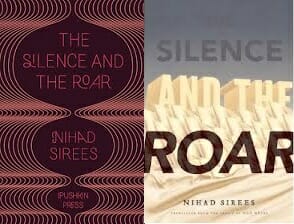Arabic Poetry: Transformation or Roar?
Two beautiful books that I read recently — Nihad Sirees’s The Silence and the Roar and Nostalgia, My Enemy — give two very different reports on the life of poetry.

Early in Nihad Sirees’s sharp The Silence at the Roar (trans. in clear, ninja-warrior style by Max Weiss), the protagonist Fathi Sheen decries the influence of Arabic poetry:
“…we are a people who love poetry so much that we love things that only resemble poetry. We might even be satisfied with only occasionally rhyming speech, regardless of its content. Didn’t someone say that the era of mass politics is the era of poetry? If so, then the reverse is also true, because poetry is geared toward the masses just like the prose I am now writing is intended for the individual. … Prose is oriented towards rational minds and individuals whereas poetry directs and is directed towards the masses. It isn’t strange that the curtailment of poetry began in the West. … Finally, I would like to point out that my country still lives in the Age of the Masses, which is why metred speech and rhyming verses are a fundamental requirement in our life.”
Here, the delightfully contrary Sheen is (probably) not referring to Adonis or Mohammad al-Maghut, but to a certain sort of popular poetry that hasn’t really died out in the West; it’s just been set to music. Later in The Silence and the Roar, we see where in the party offices slogans and this “poetry” are crafted.
Meanwhile, Saadi Youssef’s Nostalgia, My Enemy (trans. beautifully Sinan Antoon and Peter Money)opens with this homage to poetry:
Is poetry merely a reading of life?
 I believe it is deeper and more vast than that.
I believe it is deeper and more vast than that.
Humans have numerous ways of reading their life, including science and politics.
But poetry is a different matter.
If science and political struggle promise and prepare for another time, poetry is current, direct and immediate. I mean that poetry’s ability to read, participate, and change is more effective and deeper in the veins.
Poetry is transformative.
I suppose I can manage to agree with both visions because such is the trick of loving a book, and because, well, they’re talking about very different sorts of poetry.

CALL FOR SUBMISSIONS: POETRY ON SELFLESS SERVICE AND LOVE OF COUNTRY « Su'eddie in Life n Literature
December 16, 2012 @ 10:43 am
[…] Arabic Poetry: Transformation or Roar? (arablit.wordpress.com) […]
Poetry and music in the theater, 22 May | Dear Kitty. Some blog
December 17, 2012 @ 11:16 pm
[…] Arabic Poetry: Transformation or Roar? (arablit.wordpress.com) […]